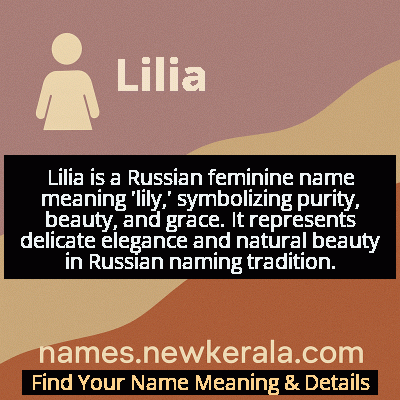Lilia Name Meaning & Details
Origin, Popularity, Numerology Analysis & Name Meaning of Lilia
Discover the origin, meaning, and cultural significance of the name LILIA. Delve into its historical roots and explore the lasting impact it has had on communities and traditions.
Name
Lilia
Gender
Female
Origin
Russian
Lucky Number
7
Meaning of the Name - Lilia
Lilia is a Russian feminine name meaning 'lily,' symbolizing purity, beauty, and grace. It represents delicate elegance and natural beauty in Russian naming tradition.
Lilia - Complete Numerology Analysis
Your Numerology Number
Based on Pythagorean Numerology System
Ruling Planet
Neptune (Ketu)
Positive Nature
Intuitive, analytical, spiritual, and inquisitive.
Negative Traits
Secretive, reserved, aloof, and can be overly critical.
Lucky Colours
Green, yellow.
Lucky Days
Monday.
Lucky Stones
Cat’s eye, moonstone.
Harmony Numbers
1, 5, 6.
Best Suited Professions
Scientists, researchers, spiritual leaders, detectives.
What People Like About You
Depth of knowledge, analytical skills, spirituality.
Famous People Named Lilia
Lilia Skala
Actress
Academy Award nominee for Lilies of the Field
Lilia Podkopayeva
Gymnast
1996 Olympic all-around champion
Lilia Osterloh
Tennis Player
Professional tennis player with multiple Grand Slam appearances
Lilia Shevtsova
Political Scientist
Renowned analyst of Russian politics and democratization
Name Variations & International Equivalents
Click on blue names to explore their detailed meanings. Gray names with will be available soon.
Cultural & Historical Significance
Extended Personality Analysis
Women named Lilia are typically characterized by their graceful presence and artistic sensibility, often displaying a natural elegance that draws others to them. They possess strong emotional intelligence and intuition, allowing them to navigate social situations with tact and understanding. Creative by nature, Lilias frequently excel in artistic fields, bringing beauty and harmony to their endeavors. Their compassionate nature makes them excellent caregivers and friends, though they maintain a certain dignified reserve that protects their inner world. Despite their gentle exterior, they demonstrate remarkable resilience and practical wisdom when facing challenges, combining sensitivity with strength in a way that inspires confidence in those around them. This balance of artistic vision and grounded practicality makes Lilias both inspiring leaders and reliable partners in both personal and professional relationships.
Modern Usage & Popularity
In contemporary times, Lilia maintains steady popularity in Russia and Russian-speaking communities, consistently ranking within the top feminine names while experiencing periodic resurgences aligned with vintage name trends. The name appeals to modern parents seeking a balance between traditional Russian heritage and universal aesthetic appeal, with its floral connotations making it accessible across cultures. Internationally, Lilia has gained recognition through diaspora communities and global cultural exchange, appearing with increasing frequency in Western countries as multicultural naming becomes more prevalent. Current usage patterns show particular strength among educated urban families who value the name's elegant simplicity and cultural depth, while its adaptability to various languages and contexts ensures its continued relevance in an increasingly globalized world.
Symbolic & Spiritual Meanings
Lilia carries rich symbolic meanings centered around purity, transformation, and transcendent beauty. Derived from the lily flower, it symbolizes spiritual purity and renewal across Christian traditions, representing the soul's journey toward perfection. The flower's growth from murky waters to radiant bloom serves as a powerful metaphor for personal growth and the triumph of beauty over adversity. In Russian symbolic context, Lilia represents not just physical attractiveness but also moral integrity, feminine wisdom, and the harmonious connection between nature and human spirit. The name embodies the concept of 'beauty with depth'—suggesting that true elegance combines external grace with internal strength and spiritual awareness, making it a name that carries both immediate aesthetic appeal and profound philosophical significance.

